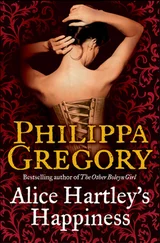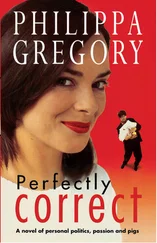Celia’s brown eyes suddenly filled with tears.
‘Oh, don’t let’s talk like that!’ she cried out in sudden passion. ‘It is we who have brought this on Beatrice. It is our fault. I have seen the village getting hungrier and more despairing and angrier. And all I have done is to try and ensure the very poorest families survived the winter. I never challenged what you and Beatrice were doing, Harry. But now I see the result of it. We have been all wrong, Harry. All wrong.’
I looked at her, my face blank. Everywhere I went I seemed to hear echoes of the message that Wideacre had gone wrong, had gone badly wrong. Whereas I believed, I had to believe, that it was all coming right. With fifty flints on the floor around my feet I stared at Celia, reproaching herself for the sorrow and hardness that had come to the land, and at Harry, speechless with anger. And at John, staring at me.
‘There’s one you missed,’ he said quietly. ‘Not a stone, a little basket.’
‘Oh, yes,’ said Celia hopefully. ‘A pretty little basket like the children make with reeds from the river.’
I looked at it dully. It was Ralph’s basket, of course. I had been waiting for it all day. Now it sat on the table and I noted with dark eyes that he had lost none of the skill with his ringers, even if he would never walk or run or jump again. It was exquisitely made. He had taken time and trouble to make his threat to me delightfully pretty, inviting.
‘You open it, Celia,’ I said. ‘I don’t want to.’
‘Are you sure?’ she asked. ‘It cannot be anything bad. Look at the work that has gone into this lid, and the exquisite little catch.’ She slid back the little splinter of wood that served as a bolt and lifted the latch. She raised the lid with gentle ringers and parted the straw packed inside.
‘How odd,’ she said in surprise.
I had expected a china owl, like the last present. Or some horrid trick like a model of a mantrap or a china black horse. But it was worse than that.
I had braced myself for months, knowing that my birthday was coming, sensing Ralph somewhere near my land. I had expected some warning from him. Some coded threat. I had imagined all the forms that it could take. But it was worse.
‘A tinderbox?’ asked John. ‘A little tinderbox? Why would anyone send you a tinderbox, Beatrice?’
I drew a deep shuddering breath and my eyes turned to Harry, the plump pompous fool who was my only help and support in this hating world that I had made all around me.
‘It is the Culler,’ I said in despair. ‘He sends me that, to tell me he means to fire the house. He will come soon.’ And I reached out to Harry as if I were being swept down the Fenny on a flood tide and the waters were closing over my head. But Harry was not there. The mist was in my head and before my eyes again, and this time the greyness was not damp and cold, but hot.
And it smelled like smoke.
I took to my bed like some London miss in a decline. I could think of nothing else to do. I feared and hated the village and did not want to go there. I could not hear the heartbeat of the land so the woods and the downs were no comfort to me. I knew that somewhere, in some secret hollow, Ralph was hiding, watching the house with his hot black eyes. Waiting for me. My office and my maps, my rent table and my accounts were just so much paper that would blaze up if someone set a tinderbox to them. There was nothing for me to challenge so I stayed in bed. I lay on my back and looked at the great carved canopy over my head, at the profusion of fruit and flowers and animals and I longed for a land like that. Where good things grew and one could eat and enjoy without starving another. And I knew, in my secret, despairing heart, that Wideacre had been a land like that before I had gone mad, and lost myself, and lost the heartbeat, and lost the love, and lost the land. All I had left to cling to was the future, was Richard and Julia and the world they might make if I could keep Wideacre long enough to hand over to them. But I was lost.
They treated me like an invalid. The cook dreamed up delicate little dishes to tempt me. But I had no appetite. How could I have? I had eaten hearty on days when I had roamed the land like a gypsy and come home dog-tired and starving. They brought Richard in to see me, but he would not sit still beside me, and the noise he made hurt my head. Celia sat by my bed by the hour, sewing in the window seat with the warm May sunshine lighting her brown hair, or reading a book in companionable silence. Harry came in, clumsily tiptoeing, twice a day. Sometimes with a sprig of hawthorn for me or bluebells. And John came in, night and morning, with a cool hard look at me on his entrance. A phial of laudanum if I asked for it, and an expression in his pale eyes that was sometimes akin to pity.
He was working against me. I knew it without having to steal his letters or check the postbag. He had been in touch with his father, and with his father’s sharp Scottish lawyers, to see if they stood a chance of reclaiming what was left of his fortune. To see if they could disinherit my son. But I knew I had tied that rock-solid. I trusted my lawyers to have forged a contract that could be broken only by the signatories. And while I held Harry in the palm of my hand, Wideacre was safe for my son. And John could do nothing against me. But he stopped hating me throughout May while I lay in my bed dozing the warm days away. He was too good a doctor. All he could do, all his disposition and training and habits forced him to do, was to watch me and note the paleness in my cheeks and the shadows under my eyes, and the way I stared sightlessly at the wooden ceiling of my bed.
Under my pillows in the great bed were two things hidden. One, hard and square, was the tinderbox. I had taken the flint from it, and the tinder, for I had a fear now of fire, and every night I would insist that Harry went around the fireplaces of the Hall to check that they were all safely doused. Inside it I kept a twist of curl-paper with a handful of Wideacre earth in it. It was the earth I had clenched in my hand all the trembling walk home; I had kept it in the bottom of my jewel box all these long years. Now I put it with the tinderbox the Culler had sent me. Ralph’s earth in the Culler’s box. If I had been the witch they called me, I would have made magic with them. And the magic I would choose would have made me a girl again and this pain and hunger and death would not have been.
I lay like a tranced princess in a daydream of death. But Celia, pitying, forgiving Celia, laid little plans for me and tempted me from my bed.
‘Harry said the wheat was looking very well,’ she said one morning towards the end of May as she sat in the window seat of my bedroom and gazed over the rose garden and paddock to the woods and the high, high downs behind.
‘Yes?’ I said languidly. I did not even turn my head. Above me was the carved roof of the bed showing corn standing tall, fat sheep, cows in calf and a tumble of fruit and sheaves of wheat from a great twirly shell. A carving to bless the master of the land with a constant reminder that the land was fertile and easy.
‘It is high and silvery-green,’ Celia said. Somewhere, among the mist in my mind, the shape and colour of the rippling fields came back to me.
‘Yes,’ I said with more interest.
‘He says that the Oak Tree Meadow and Norman Meadow are growing a crop the like of which has never been seen in the country. Great fat heads of wheat and straight tall stalks,’ said Celia, her eyes on my suddenly brightening face.
‘And the common field?’ I asked, raising myself a little in bed and turning to look at Celia.
‘That is doing very well,’ said Celia. ‘It is so sunny there, that Harry says it will ripen early.’
Читать дальше
Конец ознакомительного отрывка
Купить книгу












